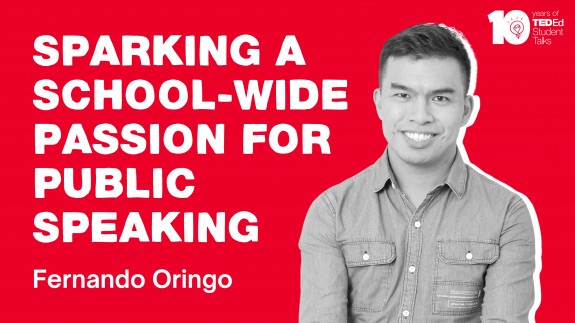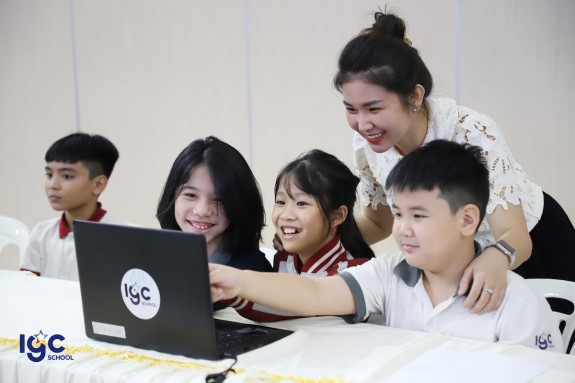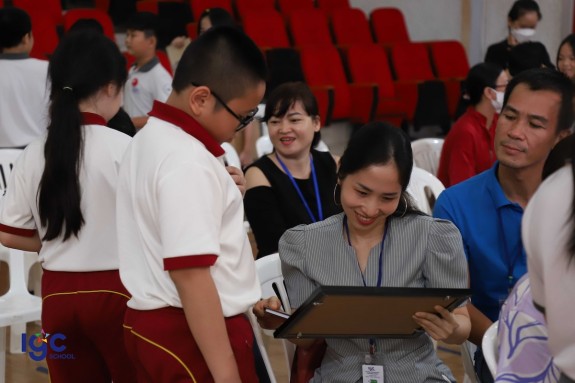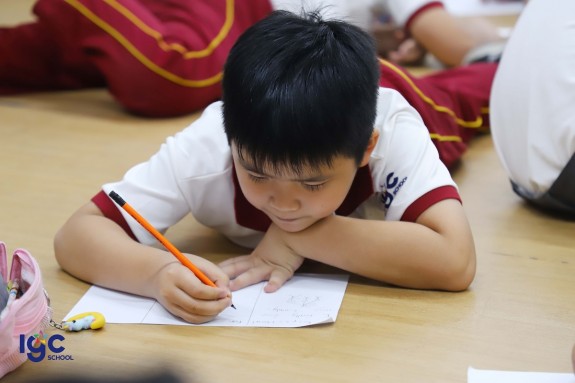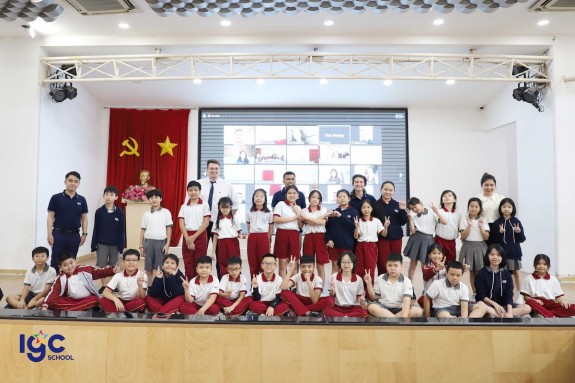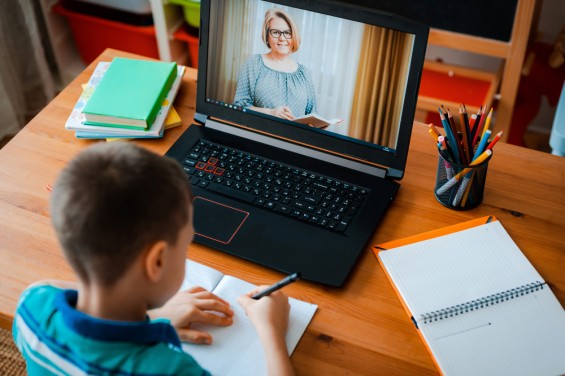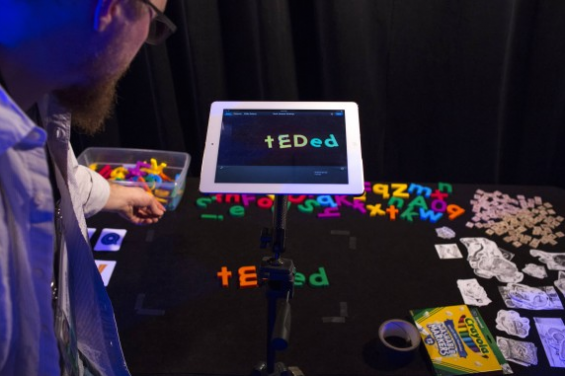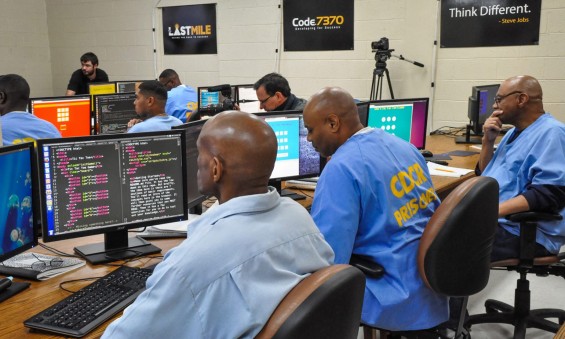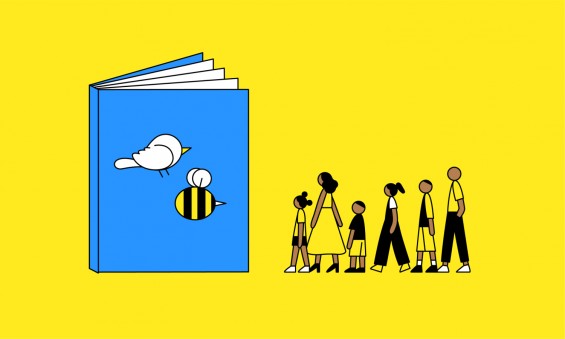
Sparking a school-wide passion for public speaking: A conversation with Fernando Oringo
Since 2014, thousands of student groups across the globe have been developing and sharing their ideas using our free TED-Ed Student Talks resources. To celebrate 10 years of TED-Ed Student Talks, we have been collecting stories of impact from the program’s facilitators as part of our “10 for 10 years” series.
For this installment of the series, we are highlighting Fernando Oringo, an educator with over a decade of experience in diverse learning environments, who has led Student Talks programs in Vietnam, Thailand, and Cambodia.
Here, he speaks with TED-Ed’s Programs Manager Sasha Rudenko about his thoughts on the program, its successes, growing pains, and how it impacted his students, fellow educators, parents, and the community at large:
Sasha Rudenko (SR): Tell us a little about IGC School, what this organization is, and about your role in particular.
Fernando Oringo (FO): IGC stands for Institute for Global Citizens and it is a group of schools around Vietnam. As of today we have more than 25,000 students from pre-kindergarten to grade 12. Regarding my role, I am in charge of extracurricular programs, specifically in the international programs of IGC group. I am also in charge of partnering with our sister schools from Thailand and Cambodia when it comes to these programs that we’re implementing as one big institution.
SR: If you were to think about what kind of students you serve in your role, how would you describe them?
FO: Being a Filipino teacher here in Vietnam, it’s a totally different culture. Vietnam, in general, they’re slowly trying to open up to other countries; opening up their culture and in such a way that they’re also opening up the concept of globalization and internationalization. I think that my students should also be open about these kinds of opportunities. So, I would describe my students as eager to learn, open for opportunities, and open-minded. There are so many small voices that I appreciate that it is really worth sharing not only in their own country but [their ideas] around the world, and that is one thing that really ignited my motivation to initiate this kind of program.
SR: If you were to pick one standout moment from your time leading the TED-Ed Student talks, what would you highlight?
FO: In terms of the activities, the Connect Calls is one of the most interesting parts because most of my students never had an opportunity to meet students from other countries. They have been so eager to get connected to people of different ages. It was just so magical that instantly our students got connected to the others [across age groups and cultures].
[Editor's note: Connect Calls are opportunities for a TED-Ed Student Talks group from any country to connect with other groups online made possible through the exclusive TED-Ed Community — a platform for all program facilitators.]
Another highlight that is very special to this journey is seeing my students go from not being able to talk in English in a complete sentence at all to creating their own speeches, and [delivering them] on stage, while being supported by the community, the parents, the foreign teachers, and our staff from the school.
“This program has not only developed communication skills but also instilled confidence and a love of learning in my students.”
They really created a community where they wanted to give every student the opportunity to share— even the stories that are so simple about toys, about the food that they love eating— and eventually [Student Talks] spread throughout our school system. Everyone is eager to have it.
One thing that scared me the most when I implemented it is would the program be successful? Will they feel bored? Will the teachers understand the essence of this program? [The response] has been really overwhelming: teachers are volunteering, students are asking before the school year starts, parents are involving themselves in supporting the program.
Right now we are implementing it as a curricular program wherein we’re trying to extend it from grades 1 to 12. And every teacher is now being informed about this program and given the opportunity to apply to learn and to explore what this kind of program offers. And checking the feedback from the teachers in our school, they have emphasized that this program promotes diversity and inclusion. Diversity as the program is set for everyone to adopt and also allows for you to make changes wherever it is appropriate within the context of the students. It is inclusive because it chooses no specific grade level.
“It’s been an incredible journey of growth and empowerment for all of us.”
SR: What are the top three skills that you’ve seen your students improve the most by going through the TED-Ed Student Talks activities and program?
FO: Firstly, it’s collaboration and communication. This is the top skill because every time we implement our program, we see students not only focusing on their own ideas and speeches, but they open themselves up, and allow themselves to be vulnerable when it comes to asking for feedback. They try to see if there’s any connections regarding the ideas that they have among the different members of the club.
Secondly, it has [helped them] develop a very strong sense of intercultural understanding. I was worried that there might be a lot of questions. If I’m going to expose my students to different cultures, to different concepts, or even videos from TEDx or TED, will they be able to get the idea behind it? And surprisingly, most of our students are getting more excited about it because they really feel connected and they are so amazed that there’s a bigger world for them to explore.
And thirdly, this program is not just improving their English proficiency— it’s improving their public speaking skills. Public speaking skills that inspire, public speaking skills that motivate people to be better, and public speaking skills that allow students to really showcase their true identity. Not only as Vietnamese people, but as people who can connect to the different issues of the world and primary students as they are. They have so many things to say about what they see and what they feel about world news right now, and the platform of TED-Ed Student Talks is giving that opportunity.
SR: Let’s think about somebody who is interested in applying like you were. What has been the most challenging part about implementing something like this at IGC and how did you overcome it?
FO: Time management. Although the program is very flexible, sometimes it can be overwhelming when you want to do everything. Along the way, you will see what is the proper pace for you to implement the program. One of the things that we learned when it comes to dealing with this problem is not seeing it as something that is mandatory. But rather seeing it as an opportunity for both students and teachers to learn and explore. And at the same time having proper communication with your administration is very essential because the success of this program is not only determined by the teachers and students, but by how the community accepts it.
It taught us a good lesson in ensuring that everyone involved in the implementation should have a common understanding [of the program]. At the same time, they should focus on the main purpose and not on the immediate impacts of the program. Time management can be a struggle but try to ensure that stakeholders are properly involved— including the parents— and everything will go smoothly.
“The excitement and pride in [parents'] eyes as their children transformed from shy individuals to articulate speakers was truly heartwarming.”
SR: Do you have any tips or words of wisdom you would share with somebody considering TED-Ed Student Talks activities for their students or classroom?
FO: For those who are interested in this program, there’s one thing that you really have to think about carefully: it’s not how it fits into the school system, but rather, will this opportunity benefit the students? Always remember that joining TED-Ed Student Talks as a facilitator and as a mentor is not for your own personal gain, but for helping them inspire [themselves] and others. And that is indeed worth sharing— not only to your classroom, not only to the smaller community, but to a bigger community: the world.
Interested in learning more about TED-Ed Student Talks? Check out our Student Talks page here to find out how the program works and how you can get involved.
Check out the other pieces in the 10 for 10 years series here.
